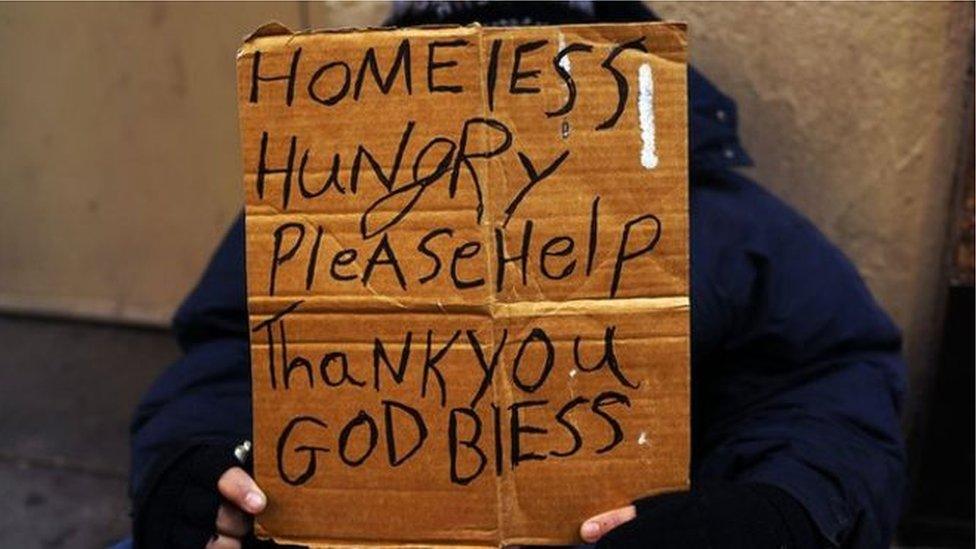One in 25 people homeless in England's worst hit areas
- Published
- comments
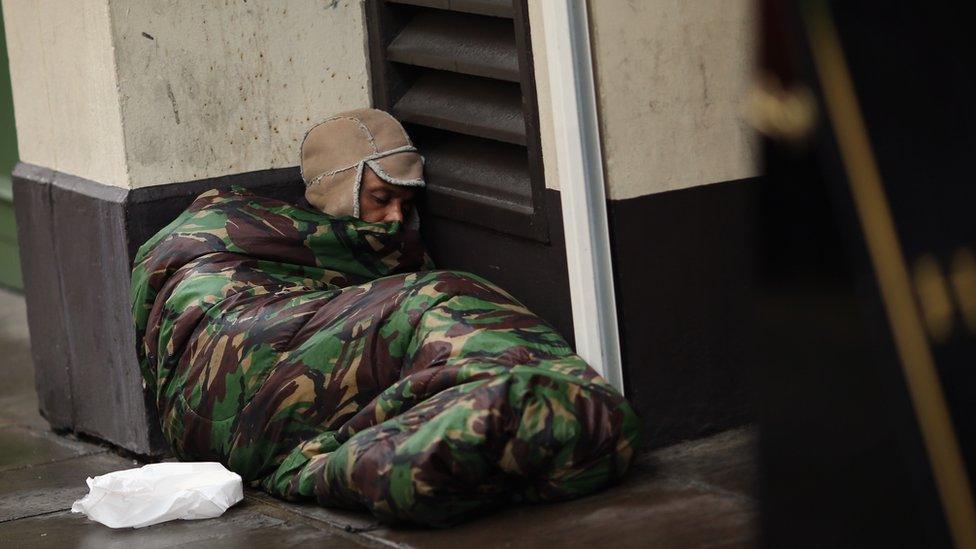
Around 4,500 people are rough sleeping in the UK, according to the new survey
As many as one in 25 people are classed as homeless in the worst-affected areas of England, a new study has shown.
Homeless charity Shelter said more than 268,000 people across England are homeless, although the number is a "conservative estimate", with many more expected to be going unrecorded.
It said the leading cause was the loss of a private tenancy, with three in 10 cases coming as a result.
The government said it was "determined to tackle all forms of homelessness".
Shelter has launched an urgent appeal to raise money for front-line services.
The definition of homelessness under law includes rough sleepers, single people in hostels and those in temporary accommodation.
Under these criteria, say Shelter, at least one in 206 people in England is classed as being homeless.
Broken down, this results in around 4,100 people sleeping on the streets and at least 242,000 in temporary accommodation.
A further 21,000 are either in hostels or being housed temporarily by social services.
London has the highest proportion of homelessness in the country, accounting for 31 of the worst hotspots - with the borough of Newham recording one in 25 people as homeless.
But other pressure points have also been identified:
Luton, where one in 52 are homeless
Brighton, where one in 69 fall into the category
Birmingham, where the figure is one in 88
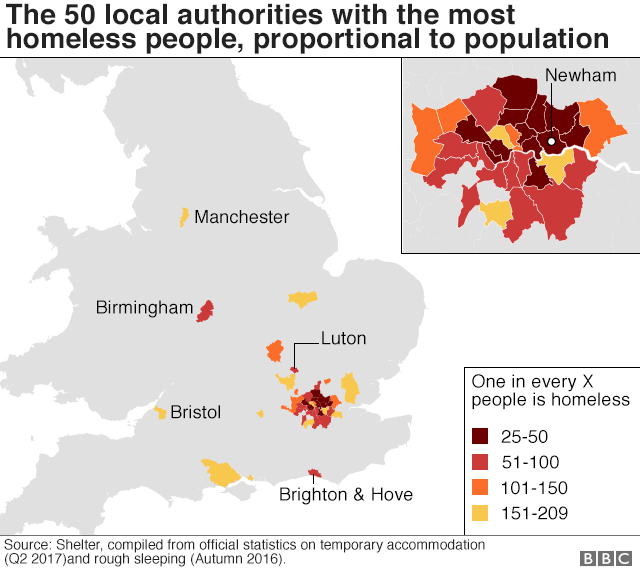
The number of temporary accommodation households has risen from 48,330 in 2011 to 78,810 at the start of 2017. Shelter believes at least 35% of those households will still be in unreliable homes in a year's time, showing little end in sight for many.
This is partly down to the number of people losing private tenancies, which the charity says has soared since cuts to housing benefits started in 2011.
Polly Neate, chief executive of Shelter, is calling for an "ambitious new direction" from the government to tackle the issue, saying: "On a daily basis, we speak to hundreds of people and families who are desperately trying to escape the devastating trap of homelessness.
"[It is] a trap that is tightening thanks to decades of failure to build enough affordable homes and the impact of welfare cuts."

'Humiliating and scary'
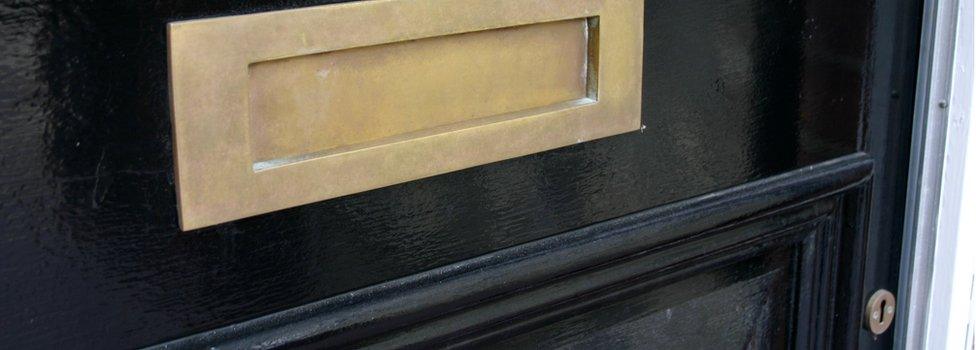
Victoria says she just wants "a safe place to call home"
At 72 years old, Victoria is homeless after her landlord decided to sell her privately-rented flat and she could not find anywhere to live.
The pensioner from London - whose surname we have not used - said that, despite always paying her rent on time, landlords did not want to rent to someone on housing benefit, and many properties in the capital were too expensive for her.
"Presenting myself as homeless was in itself humiliating and scary," she said. "You're left sitting around for hours, waiting to find out if you'll have a place to stay that night."
Victoria is now living in temporary accommodation, but is desperate to find somewhere permanent and "a safe place to call home".
"The whole thing makes me feel like there is something wrong with me," she said. "I've moved around a lot, and yet for the first time in my life I feel like I have no control over my situation.
"I'm not easily scared, but the fear is terrible - you just don't know where you are going to end up. I'm in a constant state of anxiety and stress."

Dan Wilson Craw, director of campaign group Generation Rent, said it was "incredibly easy" for private tenants to find themselves homeless, as landlords do not need a reason to evict, and called for more restrictions to be put in place.
The Local Government Association said homelessness was causing a "huge challenge" for councils, with its housing spokesman, Martin Tett, calling for more resources from the government to tackle the issue.
But the Department for Communities and Local Government said it was investing £950m into supporting efforts to tackle homelessness by 2020, and it had already given more powers to local authorities.
A spokesman said: "We are determined to tackle all forms of homelessness, which includes making sure people in temporary accommodation are getting support to keep a roof over their heads."

Analysis by BBC Reality Check
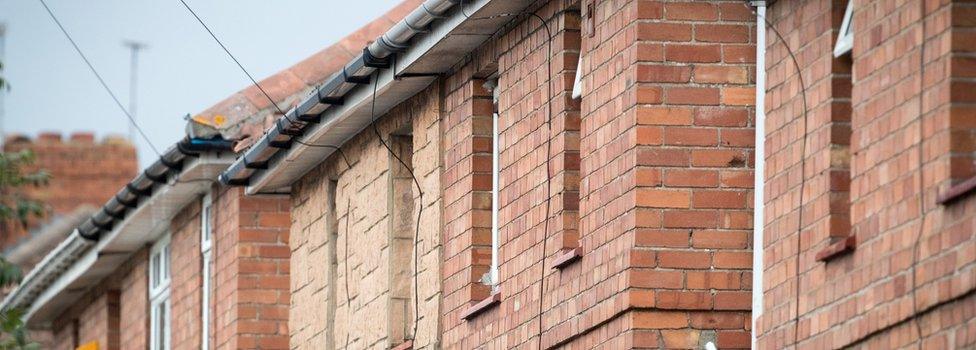
Homelessness has been rising rapidly since 2010, but it's difficult to know exactly how many people don't have anywhere to live.
Estimates of rough sleepers are calculated by counting people on a single night, and potentially millions of "sofa surfers" go under the radar.
The charity, Shelter, has pieced together various data sources to arrive at its figure.
It used official data on how many households were living in temporary accommodation to calculate how many individual people that equated to.
It looked at hostel bed occupancy to include people who turn up without being referred by the council, often paying a fee to stay, who don't appear in official figures.
And it asked councils how many homeless families they were accommodating, giving a much higher figure than the 78,180 homeless households usually quoted.

- Published5 November 2017

- Published6 October 2017
